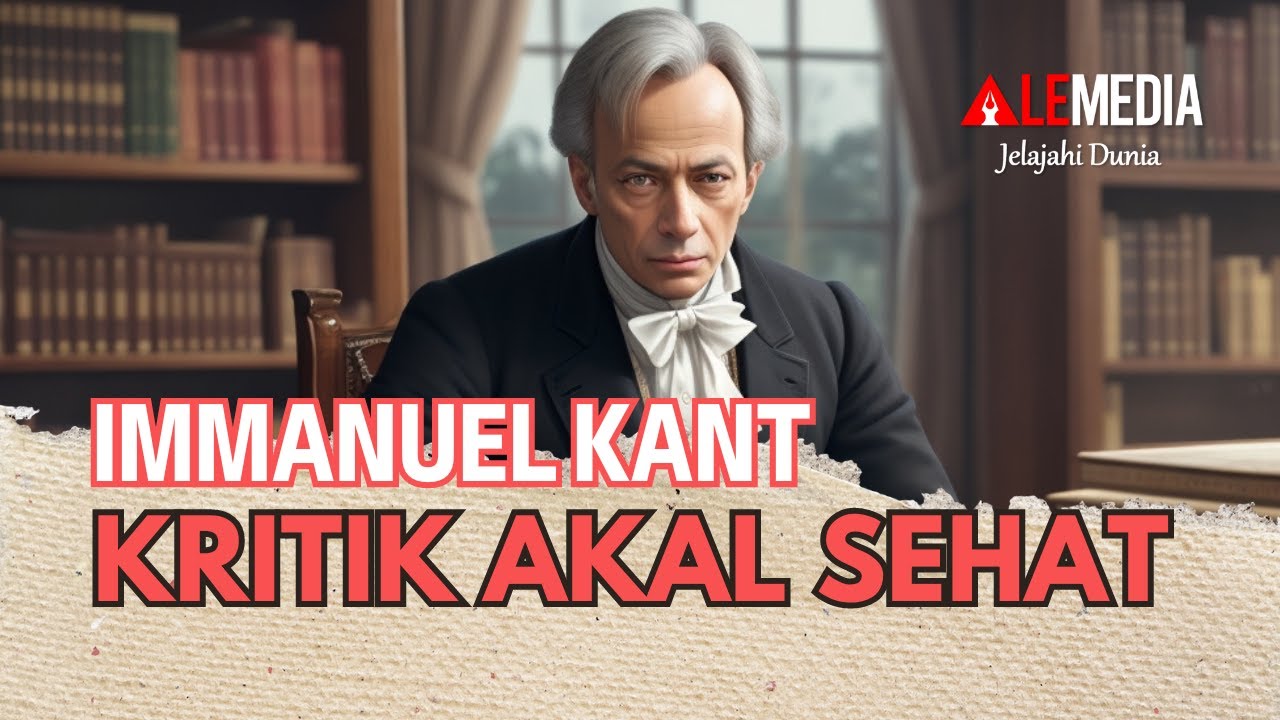Essential Enlightenment: Immanuel Kant
Summary
TLDRImmanuel Kant, a key figure in the Enlightenment, profoundly influenced Western philosophy, particularly through his concept of the categorical imperative. This moral principle asserts that actions like stealing are always wrong, regardless of the goal. Kant also championed liberty, believing people could only act morally in a society where they are free and secure. His advocacy for a fair legal system and the rule of law shaped the development of classical liberal values, including rights, justice, and democratic governance, all of which continue to impact modern societies.
Takeaways
- 😀 Emmanuel Kant was a major Enlightenment thinker known for his contributions to morality and ethics.
- 😀 Born in 1724 in Konigsberg, East Prussia, Kant had a lasting influence on Western philosophy.
- 😀 Kant's most famous concept is the 'categorical imperative,' a rule that is unconditional and absolute for all people.
- 😀 The categorical imperative emphasizes that the wrongness of an action, such as stealing, cannot be justified by a worthy goal.
- 😀 Kant believed that moral actions require freedom, as people must be free to make decisions in order to act morally.
- 😀 He argued that people living under the threat of violence or insecurity would not choose moral actions but act on instinct.
- 😀 Kant advocated for a society where liberty, security, and the rule of law allowed individuals to flourish and act morally.
- 😀 A strong, impartial legal system is vital for resolving conflicts and ensuring justice in society.
- 😀 Kant's ideas contributed to the classical liberal traditions of rights, liberty, justice, and democratic governance.
- 😀 His philosophy, especially regarding morality, liberty, and justice, remains influential in modern political and ethical thought.
Q & A
Who was Immanuel Kant and why is he significant in philosophy?
-Immanuel Kant was a German philosopher born in 1724 in Königsberg, East Prussia. He is one of the most influential thinkers of the Enlightenment, known for his contributions to ethics, morality, and the development of modern philosophy.
What is the categorical imperative, according to Kant?
-The categorical imperative is a moral principle that states actions must be universally applicable and unconditional, meaning they should be done regardless of personal goals or circumstances. For example, stealing is always wrong, even if it is done for a seemingly worthy cause.
How did Kant’s philosophy influence the development of modern ethics?
-Kant's philosophy emphasized that morality is not dependent on outcomes or goals, but rather on the inherent rightness or wrongness of actions. This principle of universal morality has shaped modern ethical theory and remains central in discussions on human rights and justice.
What did Kant believe was necessary for people to act morally?
-Kant believed that people needed **liberty** and **freedom** in order to make moral decisions. Living in a secure, just society where the rule of law prevails enables individuals to act morally, as they are free from external pressures or violence.
Why did Kant argue that the rule of law is important for morality?
-Kant argued that the rule of law is critical for a moral society because it ensures security and fairness. Without a just legal system, individuals may act out of self-interest or fear, rather than making moral decisions based on reason.
What is the connection between Kant's ideas and the classical liberal tradition?
-Kant's ideas on liberty, justice, and the rule of law laid the philosophical foundation for classical liberal traditions. His emphasis on individual rights, freedom, and a fair legal system influenced the development of democratic government and the protection of human rights.
How did Kant's views differ from those who believe the ends justify the means?
-Kant rejected the idea that the ends justify the means. He believed that certain actions, like stealing, are morally wrong regardless of the intended outcome. According to Kant, the morality of an action is determined by whether it adheres to universal moral principles, not by the consequences.
What role did Kant’s belief in liberty and freedom play in his ethical theory?
-Kant believed that for individuals to act morally, they must have the freedom to make decisions without coercion. Liberty and freedom are essential for moral development, as they allow individuals to choose actions that align with universal moral laws.
What was Kant’s perspective on the relationship between security and moral behavior?
-Kant argued that security is essential for moral behavior because, in the absence of security and stability, people are more likely to act out of instinct or fear, rather than following moral principles. A secure society enables individuals to make reasoned, moral choices.
What did Kant contribute to the study of justice?
-Kant contributed significantly to the study of justice by advocating for a fair and impartial legal system that ensures individuals are treated equally and justly. His ideas emphasized the importance of the rule of law in creating a just society.
Outlines

Этот раздел доступен только подписчикам платных тарифов. Пожалуйста, перейдите на платный тариф для доступа.
Перейти на платный тарифMindmap

Этот раздел доступен только подписчикам платных тарифов. Пожалуйста, перейдите на платный тариф для доступа.
Перейти на платный тарифKeywords

Этот раздел доступен только подписчикам платных тарифов. Пожалуйста, перейдите на платный тариф для доступа.
Перейти на платный тарифHighlights

Этот раздел доступен только подписчикам платных тарифов. Пожалуйста, перейдите на платный тариф для доступа.
Перейти на платный тарифTranscripts

Этот раздел доступен только подписчикам платных тарифов. Пожалуйста, перейдите на платный тариф для доступа.
Перейти на платный тарифПосмотреть больше похожих видео

Immanuel Kant (resumo) | FILOSOFIA

Immanuel Kant - Der Weltweise aus Königsberg

PHILOSOPHY Immanuel Kant

Immanuel Kant's radical philosophy

Mother Forkin' Morals with Dr. Todd May - Part 4: Deontology - The Good Place (Digital Exclusive)

IMMANUEL KANT 🔥 KRITIK AKAL SEHAT 🔥 #ImmanuelKant #pemikirankritis #historyb
5.0 / 5 (0 votes)
